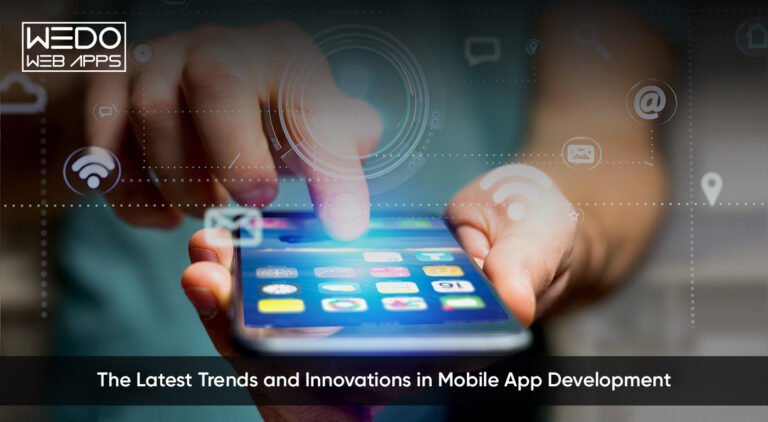16 Mar, 2023 | mobile development company
Discover the Latest Trends and Innovations in Mobile App Development

Increasing Mobile App Market
Mobile app market. With so much potential income comes a great deal of duty to adapt to shifting market standards. The increasing use of smartphones and other mobile devices, coupled with technological advancements, has created a huge demand for mobile apps. Let's examine a few factors that led to this development. #1. The mobile app market offers great opportunities for businesses and individuals to reach a wider audience, increase their visibility, and generate more revenue. #2. Mobile apps are used for a variety of purposes, including entertainment, communication, education, shopping, and more, making them an essential part of our daily lives. #3. The increasing demand for mobile apps has also led to the rise of app stores, which provide a platform for developers to showcase their apps and for users to discover and download new apps.Mobile App Development Trends
1. Cross-platform development
Cross-platform development refers to the development of apps that can run on multiple operating systems and devices. With the increasing number of devices and operating systems available in the market, it's becoming more challenging for businesses to develop apps that work seamlessly across all platforms. Cross-platform development has emerged as a solution to this problem, allowing businesses to create apps that work across multiple platforms, including iOS, Android, and Windows. This approach has several advantages, including reduced development time and cost, increased reach, and an improved user experience. However, cross-platform development also has its disadvantages. For example, apps developed using cross-platform frameworks may not be as performant as native apps, and they may not be able to take full advantage of the platform's features and capabilities.2. Internet of Things (IoT) integration
The Internet of Things (IoT) is a network of interconnected things that can talk to one another and share information. IoT has become increasingly popular in recent years, with the number of connected devices projected to reach 30.9 billion by 2025. Mobile app developers are leveraging IoT technology to create apps that can communicate with other devices and provide users with real-time information. For example, fitness apps can integrate with IoT wearable devices such as smartwatches to track users' activity levels and provide personalized recommendations. IoT integration in mobile apps has several benefits, including improved user experience, increased efficiency, and enhanced data collection and analysis.3. The Artificial Intelligence (AI) and Machine Learning (ML)
Artificial Intelligence (AI) and Machine Learning (ML) are two technologies that have been gaining traction in mobile app development. AI refers to the development of machines that can perform tasks that typically require human intelligence, such as speech recognition and image processing. Conversely, ML is a subset of AI that involves teaching machines to learn from data and improve over time. Mobile apps that integrate AI and ML can provide users with personalized recommendations, improve search results, and enhance security and fraud detection for mobile payments. For example, finance apps can use ML algorithms to detect fraudulent transactions and notify users in real-time, while e-commerce apps can use AI-powered chatbots to provide customers with personalized recommendations and support.4. Progressive Web Apps (PWAs)
Progressive web apps (PWAs) are web-based mobile applications that work like native mobile apps. They are designed to provide users with a fast and seamless experience, regardless of the device they are using. PWAs are built using web technologies such as HTML, CSS, and JavaScript, and can be accessed via a web browser. PWAs have several benefits, including improved app performance, increased user engagement, and reduced development costs. They also eliminate the need for users to download and install apps, making it easier for businesses to reach a wider audience.5. Cloud-Based Mobile Apps
Cloud-based mobile apps are designed to run on cloud servers rather than on the user's device. They rely on the internet to access data and perform tasks, making them ideal for users with limited storage space or slow internet connections. Cloud-based mobile apps have several benefits, including reduced app size, improved app performance, and increased scalability. They also eliminate the need for users to download and install updates, making it easier for businesses to roll out new features and improvements.6. 5G Technology
The arrival of 5G technology is expected to transform the mobile app development business. With faster internet speeds and lower latency, 5G technology will enable developers to create more complex and immersive apps. 5G technology will also enable mobile apps to leverage emerging technologies such as augmented reality, virtual reality, and the Internet of Things. For example, AR and VR apps will be able to provide users with more realistic and immersive experiences, while IoT apps will be able to collect and process data in real time. 5G technology has several benefits for mobile app trends, including improved app performance, increased user engagement, and enhanced data collection and analysis. As 5G technology continues to roll out, it will become an essential consideration for businesses and developers in the mobile app development space.7. Voice-Based Interfaces
Voice-based interfaces are becoming increasingly popular in mobile app development. With the rise of smart speakers and voice assistants, users are becoming more comfortable using voice commands to control their devices. Mobile apps can leverage voice-based interfaces to provide users with a hands-free and natural way to interact with the app. For example, travel apps can use voice commands to provide users with real-time flight updates, weather information, and travel recommendations. Voice-based interfaces have several benefits, including increased accessibility, an improved user experience, and engagement.
Mobile App Development Innovations
1. Augmented Reality (AR)
Augmented Reality (AR) is a technology where digital data is superimposes on an actual environment. AR technology has been around for several years, but it's only in recent years that it has become more accessible and popular. Mobile apps that integrate AR technology can provide users with immersive experiences, allowing them to interact with digital objects in the real world. For example, furniture retailers can use AR technology to allow customers to visualize how furniture would look in their homes before making a purchase. AR technology has several benefits, including improved user engagement, increased brand awareness, and enhanced customer experience.2. Virtual Reality (VR)
VR (Virtual Reality) is a technology that produces a simulated environment with which users can interact. VR technology has been around for several years, but it's only in recent years that it has become more accessible and popular. Mobile apps that integrate VR technology can provide users with immersive experiences, allowing them to explore and interact with virtual environments. For example, travel apps can use VR technology to provide users with virtual tours of destinations, allowing them to experience the destination before making a booking or gaming apps that bring out the new gaming experience. VR technology has several benefits, including improved user engagement, increased brand awareness, and enhanced customer experience.3. Wearables Integration
Wearables such as smartwatches and fitness trackers have grown in popularity in recent years. Mobile app developers are leveraging wearables technology to create apps that provide users with real-time information and personalized recommendations. For example, fitness apps can integrate with wearables such as smartwatches to track users' activity levels and provide personalized workout recommendations. Health apps can integrate with wearables to monitor users' vital signs and provide personalized health recommendations. Wearables integration in mobile apps has several benefits, including improved user experience, increased efficiency, and enhanced data collection and analysis.4. Blockchain Technology
Blockchain technology is being explored for mobile app development, particularly in the areas of security and data privacy. Mobile apps built on blockchain technology can provide users with a secure and transparent way to access and share data, without the need for a central authority. Blockchain technology has several benefits, including improved security, reduced fraud, and increased transparency. It also enables businesses to create apps that can securely and efficiently manage transactions, such as payment apps and supply chain management apps.5. Low-Code and No-Code Development
Low-code and no-code development tools are becoming increasingly popular among businesses and developers. These tools allow developers to create mobile apps with minimal coding knowledge, using drag-and-drop interfaces and pre-built templates. Low-code and no-code development tools have several benefits, including reduced development time, lower costs, and increased flexibility. They also enable businesses to create custom mobile apps without the need for a dedicated development team.The Importance Of Staying Current With New Trends And Innovations
1. Improved User Experience (UX)
Mobile app users have high expectations when it comes to user experience. By incorporating the latest mobile development trends and innovations in mobile app development, businesses can provide their smartphone users, users with a seamless and intuitive experience, increasing user satisfaction and loyalty.2. Competitive Advantage
In today's market, businesses that fail to innovate risk falling behind their competitors. By incorporating the latest trends and innovations in mobile app development, businesses can differentiate themselves from their competitors and gain a competitive advantage.3. Increased Revenue
Mobile apps have become a significant source of revenue for businesses. By incorporating the latest trends and innovations in mobile app development, businesses can create apps that are more engaging and attractive to users, increasing user retention and revenue.Find The Best Mobile App Development Company For Your Mobile App
Finding the right mobile app development company can be a daunting task, with so many companies claiming to offer the best services. Now, we'll discuss some tips on how to find the best mobile app development company for your next mobile application development or app development project.1. Identify Your Needs and Goals
Before you start looking for a mobile app development company, you need to identify your needs and goals. What do you want your app to do? On which platforms would you like your app to run on? What platforms do you want your app to be available on? Once you have a clear idea of what you want, it will be easier to find a company that can meet your needs.2. Look at their Portfolio and Reviews
One of the best ways to evaluate a mobile app development company is to look at their portfolio and reviews. Check out their website and see if they have a portfolio section where they showcase their previous work. This will give you an idea of the quality of their work and the types of apps they have developed. You can also check their reviews on platforms like Clutch or Good Firms to see what their clients have to say about their experience with the company.3. Check their Technical Expertise
Mobile app development requires a range of technical skills, including programming languages, frameworks, and tools. Make sure the company you choose has expertise in the technologies required for your project. You can ask about their technical expertise during the initial consultation, or check their website to see if they have any certifications or partnerships with technology providers.4. Consider their Communication and Project Management
Effective communication and project management are essential for the success of any mobile app development project. Look for a company that has a clear communication process and keeps you updated on the progress of your project. Ask about their project management methodologies and tools, and make sure they have a project manager who will be your primary point of contact.5. Evaluate their Pricing and Contracts
Finally, evaluate the pricing and contract terms of the mobile app agency, UK. Make sure you understand their pricing structure, including any additional costs for maintenance or updates. Also, review the contract terms carefully to ensure that they align with your project requirements and expectations. Hence, finding the right mobile app development agency London requires careful research and evaluation. By following the tips discussed, you can identify a company that can meet your needs and delivers a high-quality mobile app.Why You Should Choose WeDoWebApps LTD As Your Mobile App Developers?
WeDoWebApps LTD is one of the leading app development agencies in London. Whether you need advice, app modernization, or bespoke development from scratch (for iOS, Android, Windows, or a cross-platform solution). We have staff of qualified mobile developers is eager to realize your idea, no matter how complex. We care about the security and quality of a finished project, have practical experience with cutting-edge technologies like Magento and React Native, and carefully examine your requirements to match your expectations. Hire your most trusted mobile app development agency today.
Conclusion
Mobile app development is a rapidly evolving field, and keeping up with the latest trends and innovations is essential for businesses that want to stay competitive. Cross-platform development, IoT integration, AI and ML, AR and VR, and wearables integration are some of the latest trends and innovations in mobile app development that businesses can leverage to create apps that provide users with a seamless and engaging experience. By incorporating these trends and innovations, businesses can differentiate themselves from their competitors, increase user satisfaction and loyalty, and generate more revenue. However, it's important to remember that not all trends and innovations will be relevant to every business or app. It's essential to carefully evaluate each trend and innovation to determine whether they align with your business objectives and user needs. also read more about Estimated Mobile App Development Costs.Frequently Asked Questions
Mobile application developers are incorporating wearable technology into their apps in many ways, such as by creating apps that track fitness goals, monitor health, and offer personalized recommendations based on user data.
Blockchain technology can be used to create secure and transparent mobile apps, such as those used for supply chain management, identity verification, and secure messaging.
Prioritizing user experience in mobile app development is essential for creating apps that are intuitive, responsive, and personalized to the user's needs. This can lead to higher user engagement, increased loyalty, and ultimately, greater revenue for businesses.

